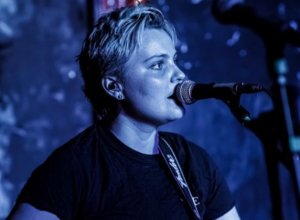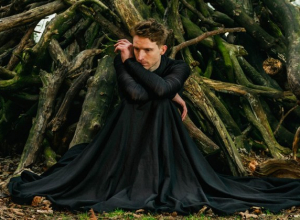The film tells the story of the relationship between the poets Sylvia Plath and Ted Hughes, and looks at its relation to Plath’s psychological problems and her blossoming into one of the twentieth century’s most important poets. At the start of the film Sylvia is already an academic wunderkind, but she burns with ambition to become a successful poet. Arriving in Cambridge on a Fulbright Scholarship, she is a splash of brash American colour against a backdrop of a dour Britain in the grip of Fifties austerity. The disappointment of a bad review for a poem she’s submitted to a university magazine is alleviated when she reads a poem by a young English graduate called Ted Hughes. She determines to meet him. Cornering him at a drunken launch party for the literary magazine, there is immediately an intensity about their connection. From the moment they set eyes on each other their fates are inextricably intertwined. They meet again in London, where Ted lives in post graduate squalor with like-minded friends. After a drunken evening of quick fire, competitive poetry reciting, the two make love for the first time. Ted notices a scar on Sylvia’s face and asks her how she got it. She tells him the story of her attempted suicide. The passion of their early courtship is intensified by the sharing of her pain. They marry. Sylvia directs her own boundless energies into the business of establishing Ted’s literary reputation. She types up his manuscripts time and time again and sends out two copies for every rejection letter she gets back. Her industry is rewarded when they hear news that Ted has worn the New York Poetry Prize. They are ecstatic and decide to uproot and go and live in America. Sylvia’s mother, Aurelia, has laid on a welcome home party for Sylvia. In a quiet moment she points out to Ted where they found Sylvia’s near dead body. She entreats him to look after her, to be good to her always. Ted and Sylvia decamp to the Coast at Cape Cod for a summer of uninterrupted writing. Sylvia dreams of the poems, the novels she will write, but when she sits down with her typewriter, she finds that nothing comes. Ted tells Sylvia she has to dare to dig deeper with her writing, to unearth hidden thoughts and feelings. But the practicalities of life intervene and Sylvia has to take up an appointment teaching English at Smith’s College. Here Ted is surrounded constantly by young female undergraduates and feted among all the literary circles of the East Coast. Sylvia becomes increasingly jealous both of Ted’s professional success and more problematically about the attention he both receives and gives to other women. Frustration and exhaustion conspire against her and culminate in an ugly and violent argument over Ted’s supposed dalliance with a female student at Smith. Running away from their troubles, Ted and Sylvia return to London. Sylvia gives birth to Frieda and Ted’s already burgeoning reputation is further established by the championing of literary critics such as Al Alvarez. Sylvia completes her first volume of poetry The Colossus, but the critical reception is luke warm. Her disappointment is compounded by Ted’s increasing industry. When he fails to return from a meeting with a radio producer, Sylvia explodes at him. Again they move – this time to Devon. In letting their London flat they meet a couple called David and Assia Wevill. David is a poet as well and they talk about all meeting again in Devon.
Ted and Sylvia have a second child, Nicholas. However, when Assia and David visit the couple in their country home at Court Green, Sylvia becomes convinced of an attraction between Ted and Assia. Her conviction is such that she sends Assia and David home. Ted goes up to London to pursue work soon after and does begin an affair with Assia. Sylvia confronts Ted and exposes the truth. Ted leaves the family home. Distraught and almost in a trance of grief, Sylvia experiences a poetic outpouring of astonishing power and profusion. In an attempt to escape the isolation she feels in Devon and partly to keep the possibility of reconciliation with Ted alive, Sylvia moves back to London finding a home in Primrose Hill. Amidst the hardest winter of the century Sylvia’s mental state deteriorates further until she realises she is no longer capable of looking after her children. In one last desperate act she arranges to meet Ted and proposes that they try to forget everything that has happened and begin again. But although part of him wants to return to Sylvia, Ted is forced to tell her that Assia is pregnant with his child. Her desperation is final. A haunting stillness overcomes her. She tucks the children into their beds, protecting them from the cold as she opens their bedroom window. In the kitchen she seals the gap in the door with towels and tape. She prepares meticulously and methodically for her end. By morning the children are found by a nurse who has been sent to check that Sylvia is coping. Sylvia’s body is found, she has gassed herself. Ted is devastated. On her desk he finds the completed manuscript of her poems, (which later form the collection Ariel), it is her goodbye note, her valediction and the work that will guarantee her reputation in posterity. Production Story “ Sylvia did not really get acknowledged for her poetry until after herdeath and this is the irony of the story of Ted and Sylvia. She wanted two thingsout of her life, one was lasting acclaim and fame for her work and the otherwas the great love of a man and ultimately she was only able to get one by losingthe other – which is her great tragedy.” (Alison Owen, Producer) The Genesis of the film “The film is very much a love story and Sylvia Plath’s movie as she tries to cope as a creative person and a mother. I was interested not only in the love story but also the implications of two powerful creative forces being brought together and how that made their lives so difficult for each other”, says Christine Jeffs, director of SYLVIA whose introduction to the project was somewhat unusual. The project had been in development for a number of years through producer Alison Owen and Jeffs recalls: “I was called on my farm in New Zealand by my agent who said you’ve got to read this script and when I realized it was a movie about Sylvia Plath it was a dream come true for me. The next stage was to meet with Gwyneth and the financiers – one day I was on the farm with my horses and the next day I had to leave for New York.” For Alison Owen, who had been developing the film for some years through her company Ruby Films, the process was rather more complicated: “I’ve always been interested in Sylvia Plath – I’ve been a fan since I was a teenager, like lots of teenage girls, and I had always thought it was a great love story between Ted and Sylvia. But I guess what made me feel that I had permission to make the film was when Ted published Birthday Letters just before his death, because he’d been notoriously private in his life until then and these last poems were a wonderful work of art, very beautiful and opened up the subject of his relationship with Sylvia. It felt that it was somehow a tacit granting of permission to look at the subject.” Owen’s first concern was to find a writer who would treat the subject matter with respect and care. John Brownlow, the writer she approached, originally comes from a documentary background. Says Owen: “He was meticulous in terms of the research and employed a researcher who interviewed many of Ted and Sylvia’s friends and acquaintances. Therefore we had our own body of information in addition to all the source material that existed.” She continues: “John did an enormous amount of research, then he sat down and wrote, and said it was the only time as a writer that he felt the muse was sitting on his shoulder. He had the information, sat down, and the story unfolded in front of him – and I think that fluidity shows in what he has produced.” Brownlow had been interested in the project as soon as Owen (with whom he had been working on another project) mentioned her desire to make a film about Sylvia Plath: “It was Sylvia Plath’s poetry that had led to my own decision when at Oxford University to switch from a Mathematics degree to an English degree.” He continues: “I was initially cautious, not because of the potentially fraught nature of the project – I was formerly an investigative documentary film maker and used to tackling controversial subjects – but because I did not know how I was going to put words into the mouths of two literary giants and I wanted to be sure we were telling a story that had some kind of universal appeal, rather than only speaking to poetry fans, and I didn’t yet know what that would be.” Having carried out extensive research over a number of months Brownlow “finally found the story I had been looking for, which was essentially to focus entirely on the relationship between Ted and Sylvia, more or less from the moment they met until the moment she died. This seemed to me to be a universal story, because here were two people who did what we all dream of – they met the person they were destined to be with. The problem was they also had the capacity to destroy each other - you could even argue that that was what they found most attractive in each other. You don’t even have to have heard of Ted Hughes and Sylvia Plath to find that a compelling story, or to want to know how it will turn out.” Owen still had to find a director and having seen Christine Jeffs’ film Rain knew that she had found what she was looking for: “When we were looking for a director, more than anything we wanted somebody who could move an audience, because that’s ultimately what the film is going to succeed or fail on – the ability to move. When I saw Rain I could not speak for five minutes afterwards and felt emotionally exhausted. It’s an extraordinary film, and I knew that Christine would make a great job of our script. From there on it was an easy road, Christine already knew a lot about Sylvia Plath and was a fan of hers.” | 






![Luke De-Sciscio talks to us about having the courage to be yourself, forgiving that which is outside of one's control and following whims [EXCLUSIVE] Luke De-Sciscio talks to us about having the courage to be yourself, forgiving that which is outside of one's control and following whims [EXCLUSIVE]](https://images.contactmusic.com/images/home/homepage/luke-de-sciscio-abof-a.jpg)



